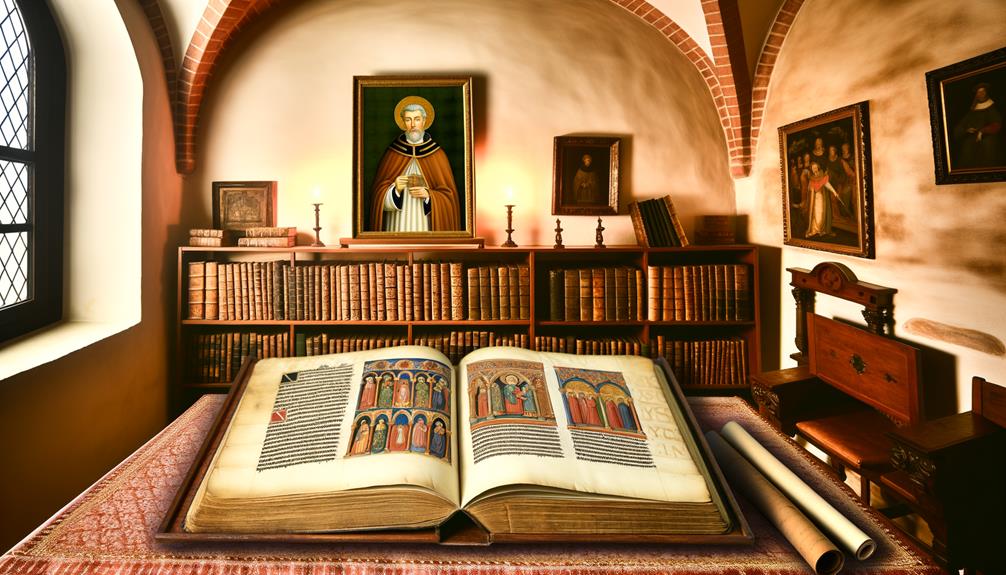Nicholas Name Meaning and Origin
The name Nicholas originates from the Greek 'Nikolaos,' combining 'nikē' (victory) and 'laos' (people). It translates to 'victory of the people,' reflecting both triumph and communal strength.
Historically prominent in ancient Greece, it gained widespread recognition through figures like Saint Nicholas of Myra. The name has been associated with leadership, resilience, and unity.
Famous Nicholases include Nicholas II and Nicholas Copernicus. Its enduring appeal is evident in various cultures and languages, adapting as Nico and Nikolai.
From literature to history, Nicholas has maintained its significance, with deeper insights awaiting those who explore further.

Key Takeaways
- Nicholas originates from the Greek name 'Nikolaos,' meaning 'victory of the people.'
- The name is composed of 'nikē' (victory) and 'laos' (people).
- Historically significant, it is associated with leaders and Saint Nicholas of Myra.
- Widely used in literature and popular culture, it signifies resilience and communal strength.
- Variants like Nico and Nikolai maintain its universal appeal across different cultures.
Greek Roots of Nicholas
The name Nicholas originates from the Greek name 'Nikolaos,' which is composed of the elements 'nikē' meaning 'victory' and 'laos' meaning 'people.' This etymological construction suggests a name imbued with connotations of triumph and communal strength.
The Greek roots of Nicholas are deeply entrenched in classical antiquity, reflecting the cultural emphasis on collective achievement and heroism prevalent in ancient Greek society. The name gained widespread popularity, transcending geographical and cultural boundaries, owing largely to its association with Saint Nicholas, the 4th-century Bishop of Myra.
The enduring legacy of this name in various forms across different languages attests to its robust historical and cultural significance, making it a timeless choice with a rich heritage.
Meaning of Nicholas
The name Nicholas, derived from the Greek name Nikolaos, encapsulates the meaning 'victory of the people.' This etymology is rooted in the combination of the Greek words 'nikē' (victory) and 'laos' (people), reflecting a powerful and communal connotation.
Understanding this origin provides insight into the cultural and historical significance embedded within the name.
Greek Origins Explored
Derived from the Greek name Nikolaos, Nicholas combines the elements 'nikē,' meaning victory, and 'laos,' meaning people, reflecting a heritage steeped in notions of triumph and communal strength. This etymological composition underlines the name's historical and cultural significance in various societies.
Analyzing its Greek origins reveals:
- Historical Usage: The name was prevalent in ancient Greece, often associated with leaders and respected figures.
- Cultural Significance: Embedded in Greek mythology and literature, Nikolaos signifies resilience and unity.
- Linguistic Evolution: Over centuries, the name has been adapted across different languages and cultures, maintaining its original essence.
Such exploration offers a thorough understanding of Nicholas, underscoring its enduring legacy and multifaceted dimensions.
Victory of People
Nicholas, translating to 'victory of the people,' encapsulates a powerful and unifying concept that has transcended centuries and cultures. Derived from the Greek components 'nike' (victory) and 'laos' (people), the name signifies collective triumph and societal success.
Historically, this name has been borne by influential figures, such as Saint Nicholas, whose legacy of charity and goodwill continues to inspire. The enduring appeal of Nicholas can be attributed to its connotations of leadership, resilience, and communal strength.
This name's prevalence across various languages and regions underscores its universal resonance, evoking a sense of shared accomplishment and human potential. Therefore, Nicholas remains a tribute to the enduring values of unity and collective achievement.
Historical Significance
Tracing its roots back to ancient Greece, the name Nicholas has held significant historical importance across various cultures and epochs. Derived from the Greek name Nikolaos, meaning 'victory of the people,' it has been widely adopted and revered throughout history.
Its historical significance can be observed through:
- Early Christian Saints: Saint Nicholas of Myra, a 4th-century bishop, whose acts of generosity became the foundation for modern-day Santa Claus.
- Royal Lineages: European monarchs, particularly in Russia, where numerous Tsars bore the name, emphasizing its regal association.
- Cultural Traditions: Nicholas' prominence in folklore and religious ceremonies, particularly in Eastern Orthodox and Western Christian practices.
These elements underscore the enduring legacy and broad cultural resonance of the name Nicholas.
Famous Nicholases
Throughout history, many notable individuals have borne the name Nicholas, leaving indelible marks in various fields such as politics, science, arts, and entertainment.
In politics, Nicholas II, the last Emperor of Russia, played a pivotal role during a tumultuous era.
Renowned in science, Nicholas Copernicus revolutionized our understanding of the cosmos with his heliocentric theory.
The arts have seen figures like Nicholas Poussin, a French painter esteemed for his classical style.
In contemporary entertainment, actor Nicholas Cage has garnered acclaim for his versatile performances.
Each of these individuals exemplifies the profound impact that bearers of the name Nicholas have made, shaping their respective domains and contributing significantly to human knowledge and culture.
Cultural Variations
The name Nicholas holds significant cultural variations, beginning with its Greek historical roots where it symbolizes 'victory of the people.'
The legacy of Saint Nicholas, a 4th-century bishop known for his generosity, further amplifies its importance across various Christian traditions.
In modern times, the name is globally interpreted, often adapted to fit linguistic preferences while retaining its core meaning and historical reverence.
Greek Historical Significance
Renowned for its etymology rooted in the Greek words 'nike,' meaning victory, and 'laos,' meaning people, the name Nicholas holds substantial historical significance in Greek culture. This name symbolizes the unification of triumph and the populace, reflecting its esteemed place in Greek history.
The following highlights underscore its cultural importance:
- Mythological Resonance: Nicholas mirrors the spirit of Nike, the Greek goddess of victory, emphasizing the cultural reverence for triumph and success.
- Historical Figures: Numerous prominent Greek leaders and scholars, such as Nicholas of Myra, have borne the name, embedding it in the annals of Greek history.
- Linguistic Endurance: The name's sustained popularity in Greek-speaking regions over centuries illustrates its deep-rooted connection to Greek heritage.
Saint Nicholas Legacy
Saint Nicholas, revered for his generosity and miracles, has inspired a diverse array of cultural interpretations and traditions across the globe.
In Western Europe, he is often depicted as the patron saint of children, delivering gifts on December 6th, his feast day.
In Eastern Orthodox Christianity, Nicholas is venerated as a protector of sailors, a tradition reflecting his maritime miracles.
Dutch settlers brought the tales of Sinterklaas to America, which evolved into the modern Santa Claus.
In Italy, he is celebrated as San Nicola, and his legends are tied to the city of Bari.
Each cultural variation maintains core elements of his benevolence while adapting to local customs, illustrating the broad and enduring appeal of his legacy.
Modern Global Interpretations
Nicholas's enduring legacy has manifested in a myriad of modern cultural interpretations, each reflecting unique local customs while preserving core elements of his historical benevolence. These variations highlight the adaptability and universal appeal of Nicholas's story.
For instance:
- Western Traditions: In many Western countries, Nicholas is synonymous with Santa Claus, embodying generosity and the spirit of giving.
- Eastern Orthodox Regions: Here, he is venerated as a protector and miracle worker, with numerous churches bearing his name.
- Scandinavian Countries: Known as Sinterklaas, Nicholas is celebrated with parades and festive activities, marking the onset of the holiday season.
These diverse interpretations underscore the global resonance of Nicholas's legacy, bridging cultural differences while celebrating shared values.
Popularity Over Time
Throughout history, the name Nicholas has experienced fluctuating levels of popularity, reflecting broader cultural and societal trends. During the medieval period, Nicholas gained prominence due to the veneration of Saint Nicholas, a significant Christian figure.
Its popularity surged again in the 19th century, particularly in English-speaking countries, likely influenced by literary and religious references. The 20th century saw Nicholas as a steady favorite, peaking notably in the 1970s and 1980s.
More recently, its usage has seen a slight decline, although it remains a classic choice. Demographic data suggest that Nicholas appeals to parents seeking a timeless yet distinguished name, underscoring its enduring resonance across various epochs and regions.
Nicholas in Literature
Numerous works of literature have featured characters named Nicholas, reflecting the name's cultural and historical significance. These characters often embody a range of traits and roles, showcasing the versatility of the name.
Notable examples include:
- Nicholas Nickleby in Charles Dickens' 'The Life and Adventures of Nicholas Nickleby' – a character who epitomizes resilience and moral integrity in the face of adversity.
- Nicholas Urfe in John Fowles' 'The Magus' – a complex figure whose psychological journey explores themes of reality and illusion.
- Nicholas Rubashov in Arthur Koestler's 'Darkness at Noon' – a representation of the internal conflicts of a revolutionary leader.
These characters contribute to the rich tapestry of literary history, demonstrating the enduring appeal of the name Nicholas.
Modern Usage
In contemporary society, the name Nicholas continues to be widely embraced, maintaining its popularity across various cultures and regions. This enduring appeal can be attributed to the name's classical origins and its association with notable historical and religious figures.
In the United States, Nicholas consistently ranks among the top names for boys, reflecting its broad acceptance. Variants such as Nico, Nikolai, and Colin also enjoy widespread use, further demonstrating its adaptability. The name's versatility allows it to fit comfortably within different linguistic and cultural contexts, contributing to its sustained relevance.
Modern parents are drawn to Nicholas for its timeless elegance and the strength it conveys, ensuring its continued prominence in naming conventions.
Conclusion
The name Nicholas, with its Greek origins and profound significance, stands as a beacon of victory and strength. Historically significant and richly adorned by famous bearers, it has woven itself into the cultural tapestry with variations across languages.
Its enduring popularity symbolizes a timeless appeal, while its presence in literature and modern usage underscores its perpetual relevance. The journey of Nicholas through time is a testament to its resilient charm and unwavering significance.






